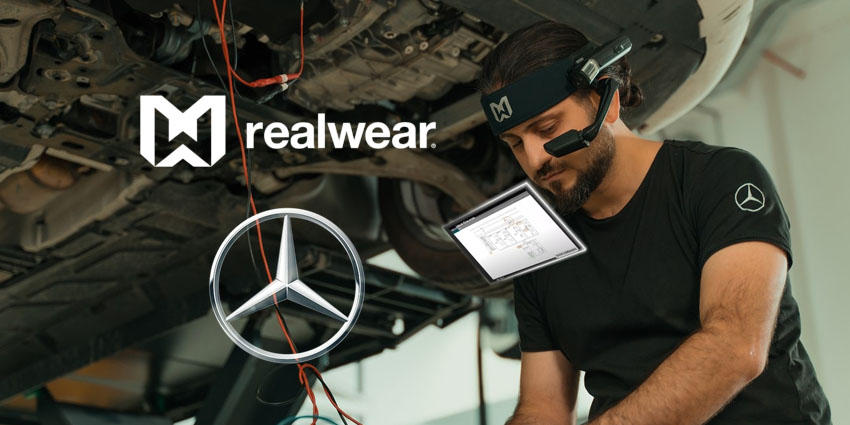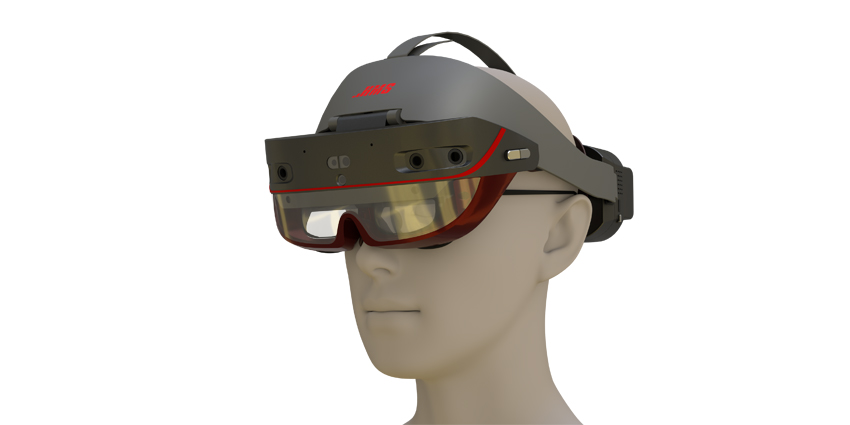Augmented reality (AR) wearables are rapidly becoming an essential addition to industrial firms seeking unified, streamlined solutions to collaborate and share data across workforces.
As the ongoing COVID-19 pandemic continues to restructure business operations across the world, enterprises have quickly embraced the technical capabilities of AR headsets as they navigate both the pandemic as well as the growing need for deployable, scalable extended reality (XR) solutions.
XR Today recently spoke to RealWear, a Vancouver, Washington-based XR firm specialising in assisted reality devices and solutions, who shared its latest case study from a partnership with Mercedes-Benz Otomotiv in Istanbul, Turkey.
XR Today: What were the issues with the previous technology in use?
RealWear: Based in Turkey, Mercedes-Benz Otomotiv has reinvented the way in which it conducts vehicle repairs and training through its deployment of RealWear’s HMT-1 assisted reality wearables across all of its 56 authorised service centres.
Prior to its country-wide enterprise wearable deployment, resolving customer issues would require in-person trips, emails, shared photos and videos and over-the-phone collaboration with subject matter experts.
With more than 240,000 vehicles on the road, the deployment of RealWear will result in wide-ranging, positive benefits, ranging from cost savings to carbon footprint reduction, efficiency and worker empowerment.
For Mercedes-Benz, a rapid response and resolution to customer problems is everything. Previously, any issues that could not be resolved required technical support staff to schedule and physically visit the dealership, costing the firm an expected $100k and 500 tons of carbon emissions per year.
The transition to using wearable assisted reality technology overcomes these challenges while reflecting the digital transformation that’s now taking place in the automotive industry.
XR Today: What was the driving force behind the need for change?
RealWear: Mercedes Benz’s search for an enterprise wearable for its technicians began in May 2020, with pandemic-related travel restrictions acting as a driving force behind the need for change.
The company wanted to maintain its high standard of customer support and resolution safely, despite this challenge. Following conversations with Tofnatech, a gold partner and authorised RealWear reseller, it conducted a four-month pilot project in several of its customer service locations.
After seeing initial success, Mercedes-Benz Otomotiv quickly scaled the deployment of assisted reality wearables throughout Turkey. Tofnatech developed a remote training program, and all service centre staff were trained on the new process.
XR Today: What new technology was implemented and what challenges did it solve?
RealWear: The technology deployed by Mercedes-Benz Otomotiv was the RealWear HMT-1, a rugged voice-enabled heads-up display fully optimised with noise cancellation. Those were important features for situations when the crew was near a busy motorway or construction site. The form factor and software frees a worker’s hands, ensuring that they can conduct the job or task with maximum safety.
The RealWear HMT-1 provides the ability for videos and pictures to be taken by the wearer and shared with an expert in real-time. This enables Mercedes-Benz Otomotiv’s customer services technical support department to conduct remote assistance to solve problems that require the additional support and technical experience of a remote team.
The rollout of HMT-1s has enabled Mercedes-Benz Otomotiv to connect experts to staff out in the field via live video calls using Microsoft Teams to settle any issues that dealers are not able to resolve. Mercedes-Benz Otomotiv’s after-sales engineering/support teams can communicate with the technician with ease and can monitor the environment through the technician’s field of view (FoV) and convey real-time instructions.
XR Today: What was the overall customer outcome?
RealWear: Since deploying the technology, Mercedes-Benz Otomotiv anticipates up to a 25 percent jump in return on investment (ROI) for on-part training scenarios and up to an expected 80 percent performance increase in customer service centre technical problem resolution where expertise from HQ is required.
Certain other processes, such as problematic warranty cases and insurance claims, have also become far more efficient using RealWear’s devices.
“If a machine with mechanical and electrical parts requires two engineers for an inspection, RealWear enables us to use one local engineer and two experts, who sit remotely, and coordinate with the local engineer wearing the RealWear headset.”
Read on:https://t.co/7GoXd5M7PE pic.twitter.com/tTsXnNwawQ
— RealWear, Inc (@realwearinc) March 10, 2022
The introduction of assisted reality technology into the automotive space is part of the wider digital transformation process that is taking place, as witnessed by the adoption of technologies such as AI and augmented reality.
With the automotive industry changing and shifting toward electric and semi-autonomous vehicles, RealWear is helping Mercedes-Benz Otomotiv stay ahead of the curve with its deployment of assisted reality wearables.







